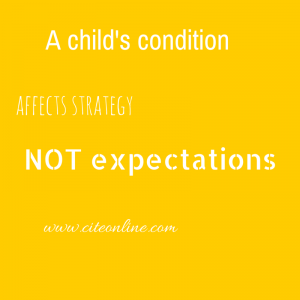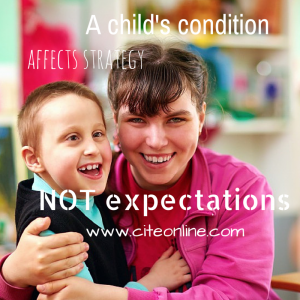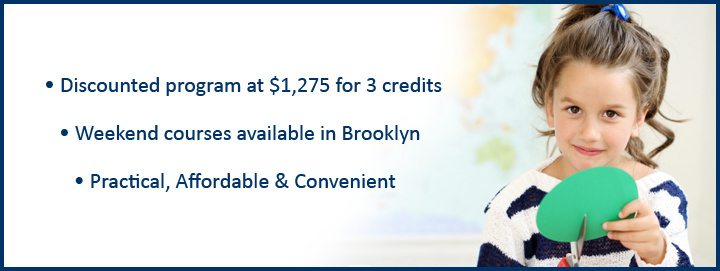
Effective LD Strategy
A CHILD’S CONDITION IMPACTS STRATEGY, NOT EXPECTATIONS — (Effective LD Strategy)
We recently had a PD day and this fabulous line was one of the key ideas of Dr. Rich Hawkins, the director of the St. Rose/CITE Educational Leadership program. He calls these key ideas “tattoos” as in you want them to be tattooed into your very being so that they are just who you are, not something external to you.
I want to reflect on this tattoo.
Listen to this story!
A CHILD’S CONDITION IMPACTS STRATEGY, NOT EXPECTATIONS
Click to share this tattoo on Twitter!
The comments that follow are mine, not Rich’s.
The idea is pretty simple. Don’t let a condition, be it poverty, LD, unstable home life, ELL, male, female etc be an excuse. If a strategy doesn’t work, try a different one.
Why is effective LD Strategy different?
As regular readers may realize, I have an LD son. LD used to stand for “learning disabled”, and now we call such children “learn differently.” That’s a better description, because my son has great spatial abilities which allow him to excel at certain academic aspects. It’s my belief, and this is the burden of Rich’s tattoo, that this ability to excel could be widened with better teaching.
Possibilities for Effective LD Strategy
Let me outline the following three possible responses we have actually experienced. In the first possibility, the school responded by changing strategies, not expectations and he was successful. In the second case, the school changed expectations, not strategies and he learned nothing because they didn’t teach anything. In the third case, the school preserved their expectations, but didn’t change strategy, and my son has struggled mightily.
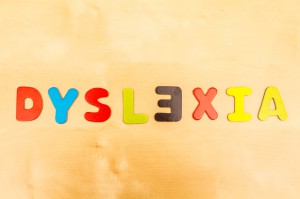
The success case was teaching him to read when he was 8. We placed him in an LD school that believed they could teach all children to read, using the Orton Gillingham method. The school believed in Orton Gillingham. The teachers were highly trained and committed to teaching using this method. In six months, a kid whose nervous parents were worried that this 8 year old wasn’t going to learn to decode, was doing it successfully.
Effective LD Strategy may not work in non-LD students
On a personal note, I found Orton Gillingham very difficult. I said to one of his teachers that if they tried to teach me to read using this method, I would never have learned to read. She said, yes, but you aren’t dyslexic. So they had the expectation that their students would learn to read, and adapted a different strategy for kids who learn differently.
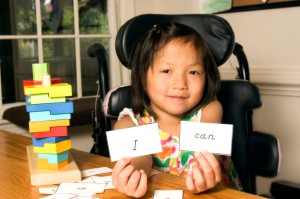
Non Effective LD Strategy
The second case is where they changed expectations, instead of strategies. The same LD school just followed the same old way of teaching math, and it simply did not work. So instead of changing strategies, they just slowed the process down to a crawl and taught almost no content.
Another non effective LD Strategy
The third case is where a school maintains its expectations, but doesn’t change its strategies when the usual approaches don’t work. In our son’s current school he struggles mightily with Hebrew and math, except for geometry which he wizzes through. His peers are also struggling mightily with Hebrew because the school is using a prestigious immersion program, but the kids aren’t getting it. The teachers just do more of the same, with predictable results. No one can do anything resembling Orton Gillingham, despite the fact that Hebrew actually lends itself to it because of the structure of the language.
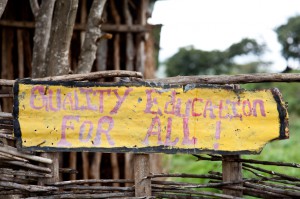
Click to share this non effective example on Twitter
The math is another failure of strategy. Our son needs the material to be more spatial and/or more related to the real world. If abstract, boring, black worksheets from Everyday Math don’t work, how about trying something a little bit more different than black worksheets from Saxon Math?
It would be much better yet if there were a math curriculum that actually had kids solving real world problems in a hands on way that appeals to kids with spatial orientation, but we haven’t discovered one yet.
Have you?? Any suggestions? Let us know on Twitter or Facebook. We’ll gladly share them with our readers!!
A CHILD’S CONDITION IMPACTS STRATEGY, NOT EXPECTATIONS (click to tweet this)
This tattoo is so important. The vast majority of kids can learn far more than they do. If a strategy isn’t working, don’t just keep doing the same thing or lower the expectations. Try a different strategy. It might make a profound difference for a kid.
Jared Gellert is the executive Director for CITE.
CITE is the Center for Integrated Training and Education . For over 25 years, CITE has and continues to train TEACHERS (Early Childhood, Literacy, Special Ed, Grad Courses, DASA); COUNSELORS (School, Mental Health Masters, Advanced Certificate); and ADMINISTRATORS (SBL, SDL, Public Admin, Online PhD) in all five boroughs of NYC, Yonkers, and Long Island.
What question can we answer for you? 877-922-2483
